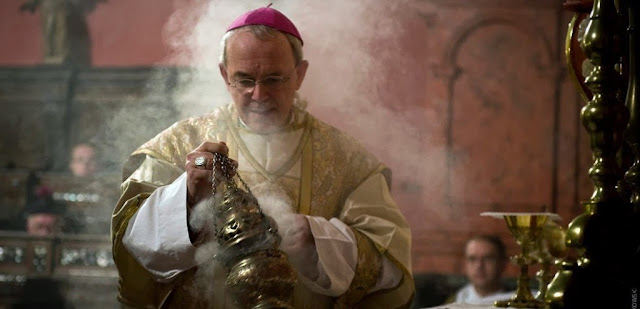Bishop Schneider's outstanding interview has implications for the transgenderism debate
Recently, the bishops of Kazakhstan and Central Asia made their visit to Rome ad limina apostolorum. This is a journey which bishops normally make every five years, to visit the tombs of the apostles St Peter and St Paul, and to give a report to the pope on the state of their dioceses. It is an opportunity for the bishops to acknowledge the universal ordinary jurisdiction of the pope, to receive his counsel, and to manifest their own concerns to him.
LifeSite News has an interview with Bishop Athanasius Schneider who participated in the recent ad limina visit. He says that some of the bishops raised concerns such as Holy Communion for the divorced and civilly "remarried", Holy Communion for Protestant spouses, and the issue of the spread of homosexuality in the Church. Bishop Schneider himself asked the Holy Father to clarify the “Document on Human Fraternity for World Peace and Living Together” which Pope Francis signed jointly with with Ahmad el-Tayeb, Grand Imam of al-Azhar, during an interreligious meeting in Abu Dhabi in early February.
The part of that document which has caused most confusion among Catholics is the statement:
“The pluralism and the diversity of religions, color, sex, race and language are willed by God in His wisdom, through which He created human beings.”As many commentators have pointed out, the pluralism and diversity of religions cannot be positively willed by God because Jesus Christ is our unique Saviour:
“There is salvation in no one else, for there is no other name under heaven given among men by which we must be saved” (Acts 4:12)God cannot positively will a different religion in which salvation is promised by some other means such as following the Koran, becoming one with Brahma, reaching nirvana, or indeed being devoted to the Flying Spaghetti Monster. As the Congregation for the Doctrine of the Faith's 2000 document Dominus Iesus "On the Unicity and Salvific Universality of Jesus Christ and the Church" put it:
"It must therefore be firmly believed as a truth of Catholic faith that the universal salvific will of the One and Triune God is offered and accomplished once for all in the mystery of the incarnation, death, and resurrection of the Son of God." (n.13)The plurality and diversity of religions can only be the "permissive" will of God, something that God allows to happen, even though it is not a good. So far, many commentators have already explained that this is the only way in which diversity of religions can be willed by God. However, Bishop Schneider makes a further and also highly important point.
He said that he tried to go more deeply into the question since "There is an evident comparison between the diversity of religions and the diversity of sexes." However, the diversity of sexes is not the permissive will of God but is positively willed by God. It is therefore misleading to mention pluralism of religions in the same clause of the same sentence, since it looks as though that is also declared to be positively willed by God.
Bishop Schneider's principal purpose in raising this concern with the Holy Father was to correct the idea that God somehow positively wills a diversity of religions. However, the truth that the diversity of sexes is something positively willed by God is important in its own right. In various western countries, including the UK and the USA, there is increasing pressure on people to accept that someone can change their "gender" by exercising a choice. This pressure can be extended by imposing sanctions against those who do not then use the gendered pronoun that suits the person's new choice of gender. Organisations will be coerced into including recognition of a newly chosen gender as part of their diversity and equality policy.
Compassion and sensitivity are not sufficiently compliant for those who would impose the ideology of transgenderism. Being kind and understanding is not enough; you must give external assent to the claim of a quasi-ontological change, you must publicly acknowledge a supposedly real condition by using the relevant pronoun and designation of man or woman. To do so would be to contradict what Bishop Schneider insisted upon, that the diversity of the sexes, the maleness and femaleness of each one of us, is positively willed by God. This is in fact the teaching of the Catechism of the Catholic Church:
Man and woman have been created, which is to say, willed by God: on the one hand, in perfect equality as human persons; on the other, in their respective beings as man and woman. "Being man" or "being woman" is a reality which is good and willed by God: man and woman possess an inalienable dignity which comes to them immediately from God their Creator. (n.369)Bishop Schneider's outstanding interview with LifeSite News is wide-ranging and covers many other matters, I do encourage you to read it in full.

